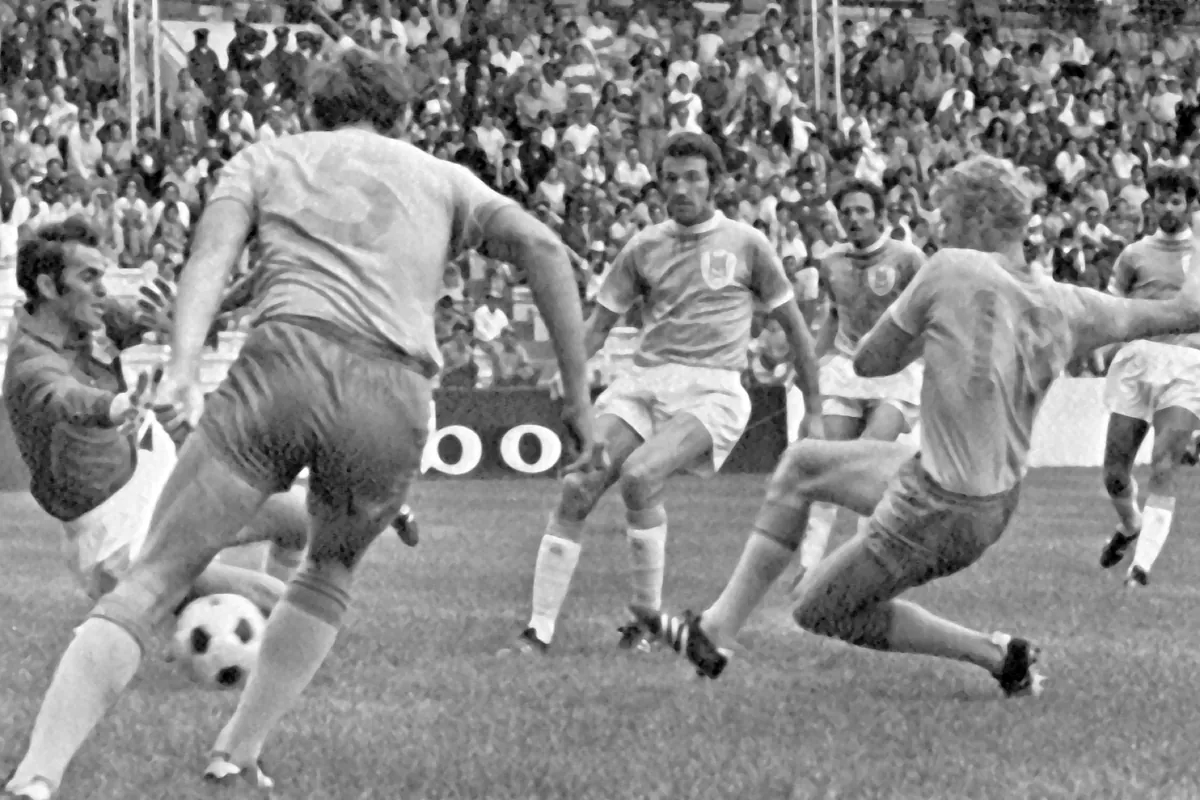Israel and football, an eternally toxic relationship: banned in Asia, unconventionally welcomed in Europe, and with a single presence (Mexico 1970)

Now that Patxi López is speculating about Spain skipping the 2026 World Cup if Israel qualifies—a rather unlikely occurrence, let's face it—I'm struck by a memory of my childhood, when the entire country fervently yearned to play against the Israeli national team in a playoff for Sweden 1958, the World Cup that gave birth to Pelé . I look back at MARCA from those days and find on the front page of December 14, 1957, a box: ISRAEL'S OPPONENT. "Eight teams, Spain among them, hoping to go to Sweden." The report from Alfil (Efe's sports outlet at the time, like Cifra's newspaper, all three with the F for Franco as the central letter) announced that the draw was postponed for two days and gave the names of the contenders: Eire, Bulgaria, Wales, the Netherlands, Poland, Romania, Spain, and the second-place finisher in the still-unresolved eighth qualifying group, which would end up being Italy. All those selected for the draw for this play-off were selected based on their group finishes, and therefore did not qualify directly.
For Spain, that had been a national tragedy. We played in a group with Scotland and Switzerland, and a miserable 2-2 draw with the Swiss at the Santiago Bernabéu left us out. We won our visit to Switzerland, we won there and lost there against Scotland, and since Scotland won both of its matches against the Swiss, we were left without a World Cup. With a dream forward line— Miguel, Kubala, Di Stéfano, Luis Suárez , and Gento —plus a large group of competent midfielders and solid defenders, and the great Ramallets in goal to boot, we were going to be left without a World Cup.
Hope dawned on Israel, the Asian group winner without playing against anyone. Qualification there was a direct knockout process. Israel was paired in the first round with Turkey, which declined to face that opponent and withdrew; Indonesia did the same in the second round and Sudan in the third, so Israel was in principle through to a no-contest qualification for the World Cup. FIFA thought this was excessive, so it improvised a two-legged, two-legged playoff between Israel and the lucky team drawn among the seven runners-up in the European groups. I was six years old, but I remember the nervousness with which the older ones entertained this possibility. On Monday the 16th, another MARCA box in the first division, again signed by Alfil and dated in Zurich like the previous one, announced the fatal disappointment, which many had already heard about on the radio: "Wales will be Israel's opponent in the World Cup qualifiers."

Wales won both matches, 2-0 and 0-2, so Israel was left out of Sweden 1958, which was, incidentally, the only World Cup attended by all four British teams. Until that edition, British participation in the World Cup was resolved by inviting the top two teams from the so-called British Home Championship, a quadrangular tournament played every year by the four British teams and which the pressures of the calendar extinguished when it turned 100 in 1984. This created controversy. The others said: why does it always have to be two British teams? They said: why can there only be two British teams? So for the occasion, they were mixed in various groups with the continental teams and in the end all four qualified, Wales by the aforementioned indirect route. This team, which was enhanced by John Charles , The Good Giant , would be scored by Pelé in the quarterfinals with his first World Cup goal. He was to return from Sweden, established at the age of 17, as a great emerging prodigy.
Israel was already a major problem for CAF (Asian Football Confederation). It created its own national team championship as early as 1956, called the Asian Cup, and found that Israel's presence had a radioactive effect. Almost no one wanted to attend, only teams from the Far East or Southeast Asia, far removed from the incessant conflict that has engulfed Israel since its creation as a state. In 1968, Iran, still highly Westernized under the rule of Shah Reza Pahlavi, joined the competition. No more than five participants participated in any of the first four editions, always with Israel present, winning one (on home soil), finishing second in two, and fourth out of four in the other. The Asian Cup only truly got underway when Israel was forced to leave.
Regarding World Cup qualifying, FIFA persuaded Israel not to participate in Chile 1962 in exchange for placing it in a European group for England 1966. The solution came late, so only South Korea and Japan registered for Asia. Korea won, but then lost in the play-offs to Yugoslavia. Ahead of England 1966, FIFA kept its promise, and Israel was indeed placed in a European group, along with Belgium and Bulgaria. It lost all four of its matches and ended up with a rather dismal goal record of 1-12. Representing Asia was North Korea, which delivered the coup by advancing to the quarterfinals thanks to a 1-0 victory over Italy, thanks to that goal from Pak Doo-Ik .
Seeing that Europe's level of play far exceeded Israel's capabilities, FIFA devised a mixed Oceania-Africa zone for Mexico 1970 that would yield only one qualifier, and it turned out to be Israel, narrowly eliminating Australia in the final minutes (1-0 and 1-1). So there, on the immense Aztec plateau, Israel would finally secure its first and, to date, only appearance in a World Cup finals. And it didn't perform badly; one could even say it was the surprise of the tournament. It was nothing like the easygoing and disorganized team that Belgium and Bulgaria had made good use of five years earlier. It was a surprise to see that they had become a competent team, which, although they started losing 2-0 to Uruguay - who would go on to reach the semi-finals, where they would fall to Pelé's Brazil, unbridled in the race for their third title - at the Cuauhtémoc Stadium in Puebla, drew with Sweden (1-1) at La Bombonera in Toluca and appeared in the same stadium against Italy, a future finalist, with a chance of progressing. They drew 0-0, and the next team were the Italians.

The first and only World Cup goal was scored against Sweden by their number 10, Mordechai Spiegler , still the greatest football star in the country's history, who had already been the hero in Australia's elimination. He was a mobile attacking midfielder, with speed, class, and a striking force. He left Israel to play first for Paris FC and Paris Saint-Germain, before moving to the New York Cosmos, where he formed part of King Pelé's luxurious court. The midfielder, Shmmuel Rosenthal , was also a great player, with presence, cutting edge, strong legs, and good delivery.
Although it was commendable, Israel's visit to Mexico '70 was nothing more than a footnote to a beautiful and innovative World Cup, with the appearance of cards and substitutions, new Adidas-designed balls, and a glorious champion, Brazil, whose jogo bonito redeemed football from the purgatory of locks and bolts that had been experienced in England '66. It also resulted in a World Cup that was colorful on television and in print publications, which had already mastered color printing techniques and took advantage of them.
Back home, the Israeli FA was denied entry into the 1972 Asian Cup by the AFC, and in 1974, it was finally expelled from the confederation. Israel was left a wandering planet in the world of football. Welcomed by FIFA, the latter found a way to be accepted by the OFC, the Oceanian confederation, on a provisional and associate basis. With the latter, it played unsuccessfully in the qualifying rounds for Germany 1974 and Argentina 1978. Ahead of Spain 1982, it participated in the European group, provisionally hosted by UEFA, but failed to qualify. It returned to the Oceanian group for two more unsuccessful attempts to reach the finals of Mexico 1986 and Italy 1990. In the latter case, it won the Oceanian group, but this only gave it half a place, and it lost in the playoff against Colombia.
In 1991, it was finally fully integrated into UEFA, and it remains so. Its clubs also began to regularly compete in European competitions. With this, football followed the path set many years earlier by basketball, where, since the late 1950s, Raimundo Saporta , first treasurer and later vice president of Real Madrid, Bernabéu's right-hand man for international affairs and FIBA's strongman, had held the leading position. A Jew himself, he emigrated from Thessaloniki to Paris with his entire family following the 1931 pogrom, and from Paris to Madrid when the Nazis invaded. He was the great driving force behind basketball at Real Madrid and in Europe. He created the European Cup for this sport, modeled on the football cup and coinciding with the third edition of the latter, in the 1957-1958 season. From the beginning, there was an Israeli team. The debut was Maccabi Tel Aviv, along with champions from 22 European countries, including Madrid. Since 1953, Israel has been admitted to FIBA Europe and regularly competes with European teams in the qualifying rounds for major championships.

Returning to football and the upcoming World Cup, Israel is playing in the qualifying phase as just another UEFA nation. Its Group I is shared with Norway, Italy, Estonia, and Moldova. It is in third place with nine points, far behind Norway (15) but tied with Italy, which is fighting for second place, which grants a playoff.
The problem now falls on Italy, which, aside from being very uncomfortable in the group due to the disastrous performance of Norway, already almost qualified, has to host Israel on October 12 in Udine, the capital of Friuli, in the northeast of the country. The 4-5 defeat of Israel the previous day took place in the Hungarian city of Debrecen, which the Israelis chose as their home ground. There were already some voices against the match back then, but now, with the incessant and horrifying parade of horror scenes on every newscast and the fuse lit in Spain with La Vuelta a España, the criticism against the match is growing. What will happen? No one knows. The mayor of Udine, Alberto Felice de Toni , says the match is "inappropriate," but does not hold a radical opinion against holding it. The president of the Federation, Gabriele Gravina , defends the need to play. His goal is now the playoff, and to give it up "would be giving it away to Israel, doing them a favor."
Do them a favor and move the problem to the next one.
elmundo




